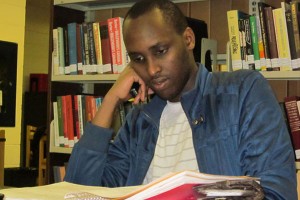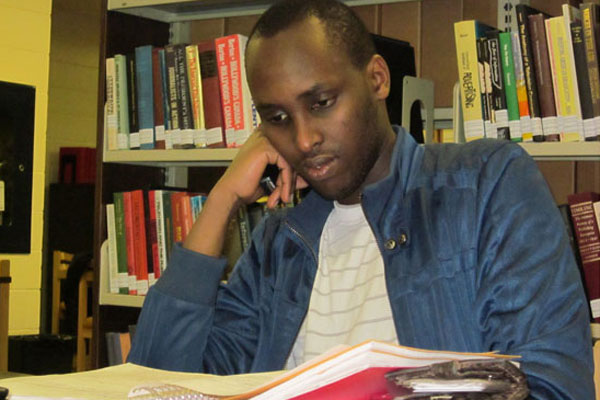The anxiety is high for those who count on leveraging their Canadian degrees to take up permanent residence in Canada after graduation.
Alexandre Inkingi, 20, was one of them when I talked to him last December. He is a second-year student in the Bachelor of Public Affairs program at Carleton University’s Arthur Kroeger College.
From his campus residence at Carleton University, his home miles away from his Zimbabwe home, he shared his story.
Though it was a Saturday, Inkingi was hard at work preparing for exams and he seemed to face a lot of stress. And being an international student myself, I understood both. On top of the ordinary obligation to work hard in school and succeed, many international students feel overstretched when they think about how far they have come from home. It can be stressful to think about how much is invested in their education, how hard they have to work in order to succeed, and how much harder they will have to work if they want to stay in Canada after school.
“There is pressure on you,” he said. “You have to do better than the rest because your parents are sacrificing a lot to send you here and you have to also think about how people back home would die to be in your position.”
I first met Inkingi at Carleton in the fall of 2010 and I would sometimes run into him on campus where I was also carrying on my work as a Master of Journalism student.
Half-way through his four-year program, he was acknowledging it was a lot of money his parents had invested in him and how big a mission he was challenged to accomplish.
“Failure is not an option. You have to finish with something,” he said as he arranged his course notes that he had displayed on a table at a shared sitting room at his residence room in Prescott House.
Inkingi said his father, a World Bank employee in Zimbabwe who comes from conflict-torn Burundi, decided to send him to study in Canada for a reason. It’s cheaper than studying in the United States and has a “less strict” immigration system. His brother, who was sent to study in the U.S., has been trying in vain to become an American citizen since 1997, he said.
He hopes to take advantage of the Canadian Experience Class immigration stream. Since 2008, the program has allowed former international students to apply for post-graduation work permits and stay in the country to work, just like other foreign skilled workers. Those who manage to obtain one year of work experience in technical, professional, managerial or trade fields may apply for Permanent Residence if their knowledge of English or French is also sound.
“It would be a loss for me if they don’t accept me but I guess it would also be a loss for them,” he said when I asked him how he will feel if he doesn’t get a permanent residence in Canada after his graduation. He said he didn’t think that could happen because Canada is interested in young and educated people and its immigration policies have been less strict.

When he has assignments and reading about Canadian domestic policies, he sometimes feels like an outsider as the rest of his classmates, who are all Canadians, talk about things he is not familiar with.
And that means more hours of research for him, he said, learning about Canadian issues because he wants to prove his ability as a student.
“Being the only foreigner in my program I feel like I have something to prove at the same time,” he said, his face growing more and more serious.
Carleton University has one of the largest populations of international students in Ontario, with nine per cent of undergraduates in this category. Some don’t make it, including one of Inkingi’s fellow students from Zimbabwe who left because of culture shock.
But most stay. A report last September on International Recruitment at Carleton University from the Office of the Provost and Academic Vice-President said that “international students were as likely or more likely to continue their studies at Carleton” for the years from 2002 to 2007.
International students also had comparable or better graduation rates than domestic students for the years from 2000 to 2006.
The report suggested that the hard work of students like Inkingi pays off.
When I invited him for coffee, he showed several pages of notes he had to read and he said he would rather go to the library.
As we talked, he kept his pen close to him and he opened his computer many times, folding it again to answer my questions. I felt guilty as I realized that every question I asked was eating into his study time.
When I asked him about his biggest challenges in Canada, he said the pressure to succeed and to integrate into the Canadian society were the hardest parts of his time here.
On integrating into Canada, he said he felt like a traveller as he continued to meet people with different backgrounds on campus. He has learned that Canada is a multicultural country and that everyone has a different background that you learn about by talking to them.
As for the pressure, he was trying to break it down into manageable stages. The first was to be a good student to please his parents. The next was to get his degree. The third was to get permanent residence in Canada after graduating.
He tries not to get ahead of himself.
“I don’t like to think too much ahead, so much into the future because I feel like I would get even more pressured,” he said.
Many other international students in Canada are in the same situation, waiting to see how they perform in school before they can decide whether they will stay in Canada or go back home.
I had a bit of a heart-breaking feeling as I pushed Inkingi to discuss his plans after graduation. I knew he was in his second-year and he still had two full years ahead.
On one hand, he was confident he would stay. On the other, he didn’t want to think beyond his next assignment.
And concentrating on school was probably what he was supposed to be doing right when I was bugging him with my questions, since how he will do at Carleton is critical to his future.
After a few minutes, he picked up his computer and his notes and went to the library. I asked him again if he wanted to stop for coffee. He wasn’t interested.
________________________________________________________
Read more:
Canada’s reliance on immigration for population and workforce growth
_____________________________________________________
Related Links:
Enacting the Canadian Experience Class immigration stream (Canada Gazette)
Statistics Canada’s Population Projections (2009 to 2036)
A ten-year outlook for the Canadian labour market (2006-2015)
